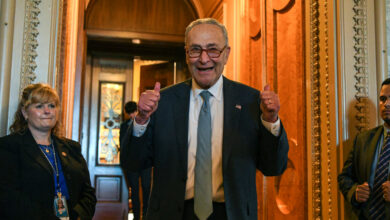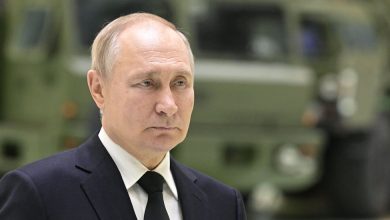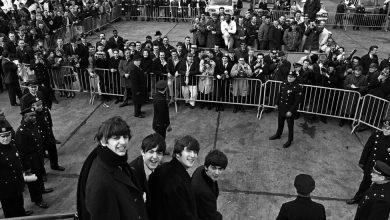Zelensky Pleads to Parliament for More Help. What Can Canada Offer?

The appearance by President Volodymyr Zelensky of Ukraine before the Canadian Parliament this week may have been virtual, but the emotions it generated were very much real. Even before Mr. Zelensky began to speak, members of the House of Commons and the Senate gave him two sustained standing ovations. When he finished speaking, he received yet another standing ovation, this one lasting for three minutes.
[Read: Zelensky’s appeal to Canada: Imagine if Toronto were Kyiv.]

President Volodymyr Zelensky received several standing ovations while addressing the Canadian Parliament earlier this week.Credit…Pool photo by Adrian Wyld
Mr. Zelensky had two requests for the Canadian government and its citizens. He wants Canada to support the establishment of a no-fly zone above Ukraine, and he asked Canada for increased military and humanitarian aid.
“How many more cruise missiles have to fall on our cities until you make this happen?” Mr. Zelensky said when pleading for a no-fly zone during his speech.
Despite the warm reception Mr. Zelensky received in Parliament, Mélanie Joly, the foreign affairs minister, quashed any hope that Canada would change its position and endorse a no-fly zone, a stance it shares with its NATO allies.
“At this point, my understanding is that there are no countries that are supporting the no-fly zone because they have the same assessment as we do, which is this would be escalatory,” she told the editorial board of The Toronto Star on Thursday, before leaving to attend a NATO meeting in Brussels.
My colleague Austin Ramzy recently wrote that the type of no-fly zone Ukraine is seeking — banning flights over a specific area to prevent hostile action by military aircraft — came out of the Persian Gulf war.
[Read: Here’s why Western leaders are reluctant to impose a no-fly zone over Ukraine.]
This week, another colleague, Max Fisher, wrote that any attacks on Russian aircraft or air bases to enforce a no-fly zone “could easily spiral out of control or trigger the Kremlin’s fears of a NATO push to Moscow, leading Mr. Putin to launch a last-resort nuclear strike.”
The consequences of that would be unthinkable, Max writes. Even a single nuclear strike by Russia could set off “a tit-for-tat exchange that, in escalating to strategic weapons like intercontinental missiles, could kill 34 million people within a few hours.”
[Read: As Russia Digs In, What’s the Risk of Nuclear War? ‘It’s Not Zero.’]
Canadians and the federal government, of course, were quick to offer other forms of support to Ukraine. As of Friday morning, Canadians had donated 82 million Canadian dollars to the Canadian Red Cross for relief — a sum that doesn’t count the federal government’s matching donation of 30 million Canadian dollars.
The Canadian government is also taking steps to ease immigration processes for Ukrainians. This week, officials rolled out an accelerated digital application process that will allow Ukrainians to work in Canada for up to three years. (Some immigration policy experts noted the contrast between this new system and the slower, more cumbersome process for Afghan refugees looking to permanently settle here.)
As the war drags on, it seems likely that Ukrainians will need additional help. And as Canada ponders how to assist them, it’s worth remembering a potentially awkward reality: Canada is likely to indirectly profit from the West’s isolation of Russia in a number of ways.
While trade between Canada and Russia is not extensive, the countries compete in world markets for a wide range of resources, including grains, lumber and other forestry products, potash for fertilizers, nickel and other minerals and, perhaps above all, oil and gas. Ukraine is also a major exporter of wheat and other grains.
The effect of more than three weeks of war has not been so much to create new markets for Canada as it has been to raise the prices of commodities, in some cases sharply.
In Alberta, after years of low prices had slowed the economy and battered the provincial government’s finances, oil prices were beginning to rise before the invasion. But moves to shut out Russia, one of the world’s top three oil producers, from global energy markets has only added to the pressures driving up prices. Clifford Krauss, a Times energy reporter and a former Toronto correspondent, wrote that, throughout history, “there have been few comparable disruptions of oil supplies.”
[Read: Loss of Russian Oil Leaves a Void Not Easily Filled, Straining Market]
To find out more specifically what the developments mean for Canada’s economy, I spoke with Rory Johnston, a commodities economist formerly with the Bank of Nova Scotia who publishes a newsletter on commodities.
Russia-Ukraine War: Key Things to Know
The Biden-Xi talk. In a two-hour call with China’s President Xi Jinping, President Biden discussed the Russian invasion of Ukraine, detailing the implications and consequences if Beijing were to provide material support to Russia in its attacks.
In the city of Mariupol. At least 130 people were rescued from a theater that was destroyed in the Ukrainian city. Up to 1,000 people were believed to be taking shelter in the building, and hundreds remain unaccounted for.
An attack in the west. A missile strike rattled the outskirts of Lviv, a western city that has been a haven for people fleeing areas under siege. The mayor of the city said several missiles had struck an aircraft repair plant at the airport in Lviv, destroying the buildings.
A looming energy crisis. The International Energy Agency said that the repercussions of Russia’s invasion of Ukraine are likely to intensify over the next several months, and nations around the world should respond by reducing their use of oil and gas.
Russian losses. British intelligence reports say that Russian forces have “made minimal progress on land, sea or air in recent days.” The Pentagon estimated that 7,000 Russian soldiers have been killed, more than the total of American troops killed over 20 years in Iraq and Afghanistan.
He doesn’t anticipate a return to the overheated days of the previous decade when oil sands jobs went begging and Fort McMurray, in Alberta, was known by some as Fort McMoney. But, the price increases have already restored profits to oil companies, stabilized employment after years of layoffs and significantly boosted both royalty payments to governments and tax payments. The boost in government revenues far outstrips the cost of any aid offered to Ukraine so far.
All these benefits, he said, will offset the pain that Canadian consumers now feel at gas stations and when opening inflated gas or oil heating bills — at least in economic terms. Even so, the pain will be great for consumers in the short term. Mr. Johnston said that the current oil price hikes have raised gasoline prices more than previous increases in the cost of crude, because the Canadian dollar remains relatively, and unusually, low compared with the U.S. dollar, the currency in which oil is priced.
But Mr. Johnston said that the biggest long-term gain to Canada may be how the rest of the world views the country.
“People are talking about energy security, and I really haven’t heard that phrase used since 2014,” he said. “Globally, the biggest beneficiary in the oil industry from energy security talk is Canada. It’s always been viewed as such a reasonably safe, stable source of supply.”
Trans Canada
-
Miriam Jordan, who reports on the effects of immigration on the society, culture and economy of the United States, has pieced together the events that led to the discovery of the four ice-encased bodies of the Patel family near Emerson, Manitoba, after the family became lost in a blizzard just 15 yards from the United States border. The family had been abandoned by smugglers.
-
Margaret Atwood portrayed the blind prophet Tiresias, a character that pops up in several of Sophocles’ tragedies, first as a man and then as a woman, in a dramatic reading of “Antigone” this week. She had welcomed the invitation to participate, telling the producer: “You want me to play an old, blind transgender prophet? That’s a dream come true!”
-
Unvaccinated Major League Baseball players in the United States will have to stay home when their teams compete in Toronto.
-
Michael Bublé described his music this way in an interview with Jeremy Gordon: “It’s hard to categorize what I do; people would like to, and I’ve fought it my whole life,” he said. “I categorize myself as a soul singer who loves the great American songbook, but loves writing pop songs. It’s a very strange place to live.”
-
Denis Villeneuve, the Montreal-based director of “Dune,” and his sound team reveal the techniques they used to create the sounds of the film. Among other things, Rice Krispies were involved.
-
A former Canadian Olympian, now a sports academic, makes the case for barring Russian athletes from participating in global sports competitions because of the invasion of Ukraine.
-
Canada will lift some pandemic measures for travelers entering the country on April 1.
A native of Windsor, Ontario, Ian Austen was educated in Toronto, lives in Ottawa and has reported about Canada for The New York Times for the past 16 years. Follow him on Twitter at @ianrausten.
How are we doing?
We’re eager to have your thoughts about this newsletter and events in Canada in general. Please send them to [email protected].
Like this email?
Forward it to your friends, and let them know they can sign up here.





